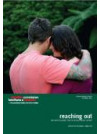Our researchers talked in depth to 50 people to find out how they accessed information and support to sustain their couple relationships.
We found that people often discuss relationship problems, not with professional counsellors, but with their family, friends, GPs, nurses, school teachers, church ministers and community elders.
Purpose
This qualitative study focuses on how people gain information and support to sustain their couple relationships. This is an under-researched topic, particularly in New Zealand.
The study explored how, why, when and from where people accessed information and support for their couple relationship. It also examined the barriers to and enablers of accessing information and support, and people's experiences of support.
The study specifically examines:
- how, why and when people access information and support (formal and informal) for their couple relationships
- where people seek information and support
- the barriers to and enablers of access to information and support
- people’s experiences of being supported.
Methodology
This study employed an adapted Life History Calendar (LHC) methodology. Yoshihama, Gillespie, Hammock, Belli, and Tolman’s (2005) LHC model was adapted to create a relationship calendar. Each participant was invited to discuss the events and challenges affecting up to three significant relationships (including their current one), and the support they sought for these couple relationships.
A total of 50 face-to-face semi-structured interviews were carried out with people in couple relationships. This sample size was chosen to include a breadth of backgrounds and life experiences. The decision not to interview both members of any couple and not to interview couples together was based on the need to avoid the risk that participants’ disclosure of information might damage their relationships; and the recognition that the power dynamics of couple relationships could preclude full and frank discussion.
Key Results
We found that family and friends were hugely important in providing support – whether by providing a sympathetic ear or by getting actively involved in addressing a relationship issue. We also uncovered an area of relationship support which is relatively unresearched – general practitioners, midwives, school teachers, church ministers and community elders going beyond their primary responsibilities to support couple relationships. Some of the people in this study had also sought support from professional counselling services.

